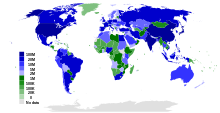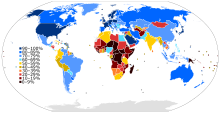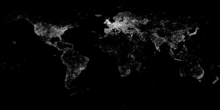Wikipedia:Systemic bias
This is an explanatory essay about Wikipedia:Neutral point of view. This page provides additional information about concepts in the page(s) it supplements. This page is not one of Wikipedia's policies or guidelines as it has not been thoroughly vetted by the community. |
| This page in a nutshell: Wikipedia aims for a neutral point of view, but it falls short due to systemic bias caused by the narrow demographics of its editing community. This bias results in underrepresentation of Global South perspectives, limited access individuals, and women, among others. |
Wikipedia strives for a neutral point of view, both in terms of the articles that are created and the content, perspectives and sources within those articles. However, the encyclopedia fails in this goal because of systemic bias created by the editing community's narrow social and cultural demographic. Bias can be either implicit when articles or information are missing from the encyclopedia, or explicit when an article's content or sources are biased. This essay addresses issues of systemic bias specific to the English Wikipedia.
As a result of
While there are some external factors that contribute to systemic bias (such as availability of sources and disproportionate global media coverage of events in predominately white Anglophone countries), there is also a vast body of
The "average Wikipedian"
Wikipedia's systemic bias portrays the world through the filter of the experiences and views of the "average Wikipedian". The common characteristics of average
Women are underrepresented
Women are underrepresented on Wikipedia, making up only 8.5–15% of active contributors in 2011.[4][5] A peer-reviewed study published in 2013 estimated 16.1% of editors were women.[6]
The gender gap has not been closing over time and, on average, female editors leave Wikipedia earlier than male editors.[7] Research suggests that the gender gap has a detrimental effect on content coverage: articles with particular interest to women tend to be shorter, even when controlling for variables that affect article length.[7]
Women typically perceive Wikipedia to be of lower quality than men do.[8]
Those without Internet are underrepresented


Internet access is required to contribute to Wikipedia, so people who have less access to the internet, including people in developing nations, the
Mobile device users are underrepresented
While
English-speaking editors from Anglophone countries dominate
Despite the many contributions of Wikipedians writing in English as a non-native language, the English Wikipedia is dominated by native English-speaking editors from Anglophone countries (particularly the United States, United Kingdom, Canada, and Australia). Anglophone countries are mostly in the global North, thereby accentuating the encyclopedia's bias to contributions from First World countries. Countries and regions where either English is an official language (e.g. Hong Kong, India, Pakistan and other former colonies of the British Empire) and other countries where English-language schooling is common (e.g. Germany, the Netherlands, and some other European countries) participate more than countries without broad teaching of English. Hence, the latter remain underrepresented. The majority of the world's population lives in the Northern Hemisphere, which contributes toward a selection bias to a Northern Hemisphere perspective. This selection bias interacts with the other causes of systemic bias discussed above, which slants the selection to a pro-Northern Hemisphere perspective.[15] Wikipedia is blocked in some countries due to government censorship. The most common method of circumventing such censorship, editing through an open proxy, may not work as Wikipedia may block the proxy in an effort to prevent it from being abused by certain users, such as vandals.
An American or European perspective may exist



Maps of geotagged Wikipedia articles and geolocated images on Wikimedia Commons show notable gaps in comparison to the density of items in the GeoNames database.
Most English-speaking (native or non-native) contributors to Wikipedia are American or European, which can lead to an American or European perspective. In addition, Anglophone contributors from outside of the United States and countries in Europe are likely to be more familiar with those countries than other parts of the world. This leads to, for example, a 2015 version of "Demonym" (an article that ostensibly is on all demonyms for all peoples across the globe) listing six different demonyms in the article lede, with five of them being western or central European nationalities, and the other being Canadian. Another example is that a 2015 version of the article "Harbor" listed three examples in the article lede all from California.
External factors
Because
Availability of sources may cause bias
Availability of sources is not uniform. This manifests both from the language a source is written in and the ease with which it can be accessed. Sources published in a medium that is both widely available and familiar to editors, such as a news website, are more likely to be used than those from esoteric or foreign-language publications regardless of their reliability. For example, a 2007 story on the
Representation in sources may cause bias
Representation within sources is not uniform due to societal realities, and the external lack of coverage results in an internal lack of coverage. A 2015 survey[16] of material from 2000 U.S. newspapers and online news found that:[17]
- Between 1983 and 2008 in 13 major U.S. newspapers, 40% of mentions went to 1% of names, and the people that received the most mentions were almost all male.
- Male names in those 13 newspapers were mentioned four times as often as female names.
- When the dataset was expanded to all 2000 sources, the ratio increased to nearly 5:1.
- The authors proposed that "the persistent social realities of acute gender inequalities at the top in politics, the business world, and sports translate into highly imbalanced gender coverage patterns".
The
Examples
- Ethnocentric articles present a national situation as if it were global. In-depth coverage of national situations belongs in a national article.
- Wikipedia editors belong to a social class that has internet access and enough leisure time to edit Wikipedia articles, so issues of interest to other social classes aren't well covered.
- Perspective bias is internal to articles that are continuous aspectthat these concepts exist outside of the industrialized world.
- Popular culture topics, especially television and video games, are often covered as if only the US, the UK, and Japan exist (depending on the origin of the Wikipedian).
- The historical perspective of the Allies of World War II, particularly the US and the United Kingdom, prevails. As of March 22, 2012, 11 featured pictures on World War I were of Allied origin and none from the Central Powers.
- Articles containing a "Religious views" section frequently include Christianity, Islam, and Judaism while neglecting the views of other religions. Ideally, an article describing religious views on a topic should incorporate Christian, Muslim, Hindu, and Buddhist views, at a minimum, though the exact choice of religious opinions will depend upon the topic's scope (e.g., a Chinese topic might not necessitate a Christian view, but it might necessitate a Taoist view). Religions' views should be allocated space in accordance with due weight. One should be especially careful to not give more weight to Christian views on a non-Christian topic than to the views of religions more associated with that topic. For instance, as of 13 April 2022, the "Influence" sectionof the article on the Zohar, a foundational work in Jewish mysticism, devoted four times as much space to the document's influence on Christianity as it did to its influence on Judaism.
- Wikipedia content is skewed by widespread editing by persons with conflicts of interest, including corporations who pay staffers and consultants to create articles about themselves. This skews Wikipedia content toward POVs belonging to persons and corporations who pay for marketing.
- Articles where the article name can mean several different things tend to default to subject matter more familiar to the average Wikipedian.
- Eurocentricism is particularly visibile in coverage of recent events. Such events are edited out of proportion with their significance. Jennifer Wilbanks, an American woman who attracted media attention when she was presumed kidnapped but actually ran away to avoid marrying her fiancé, has a significantly longer article than Bernard Makuza, who was Prime Minister of Rwanda from 2000 to 2011. Additionally, the "In the news" section on Wikipedia's front page features a disproportionate amount of news from English-speaking nations.
- Recentismis a bias toward coverage of recent events. It is caused by the difficulty of finding journals, magazines, and news sources from the pre-internet era.
- Some astronomy articles discuss the night sky as seen from the Northern Hemisphere without adequate coverage of the view from the Southern Hemisphere. Sometimes "not visible from the Northern Hemisphere" is used as a synonym of "not visible at all". Some obscure constellations in the Northern sky are covered in more depth than more prominent Southern constellations.
- Articles often use Northern Hemisphere temperate zone seasons to describe time periods that are longer than a month and shorter than a year. Such usage can be confusing and misleading for people who live in the Southern Hemisphere and for people in tropical areas that do not experience temperate-zone seasons.
- Due to severe restrictionson the use of images that are not free content, certain groups of articles are more likely to be illustrated than others. For example, articles on American politicians often have images while articles on Nepalese politicians usually do not.
There is further information on biases in Geography, in Politics, in History, and in Logic. See also Countering systemic bias: Project details for an older introduction.
Why it matters
Systemic bias violates
What you can do
Read about other people's perspectives, work to understand your own biases, and try to represent Wikipedia's NPOV policy in your editing. Invite others to edit, and be respectful of others' views. Avoid topics where you expect that you are biased or where you don't wish to make the effort to overcome those biases.
Read newspapers, magazines, reliable websites, and other versions of Wikipedia in languages other than English. If you know only English, read articles from other countries where English is a primary language, like Australia, Canada, India, Kenya, New Zealand, Pakistan, South Africa, or Nigeria. Also, some countries where English is not an official language do have important English-language press (such as Brazil, Egypt, or Israel). Where such English-language press is not available, automated translation, though imperfect and error-prone, can enable you access articles in many languages, and may be a reasonably adequate substitute. Consider learning another language.
There is a vast body of
Use judicious placement of the {{ templates in Wikipedia articles which you believe exhibit systemic bias, along with adding your reasoning and possible mitigations to the corresponding talk pages.
Barnstar

|
The Systemic Bias Barnstar | |
| This Barnstar may be awarded to Wikipedians who help reduce the encyclopedia's systemic bias.
|
See also
- Academic studies about Wikipedia § A minority of editors produce the majority of persistent content
- WP:Tendentious editing § Characteristics of problem editors
- Criticism of Wikipedia § Systemic bias in coverage
- Wikipedia:WikiProject Countering systemic bias/Global perspective
- Wikipedia:Geographic imbalance
- Bias blind spot
- FUTON bias
- WEIRD bias
- Gender bias on Wikipedia
- Racial bias on Wikipedia
- Halo effect
- {{Systemic bias}} template
- {{Globalize}} template
- WP:Bias and prejudice, a principle from the Arbitration committee
- Wikipedia:Notability is not a level playing field
- Wikipedia:NPOV means neutral editing, not neutral content
- Wikipedia:Race and ethnicity
- Wikipedia:WikiProject Indigenous peoples of North America/Determining Native American and Indigenous Canadian identities - most Wikipedians find this topic overwhelming and confusing; we're here to help
- False consensus effect
Notes
References
- ^ "Wikipedia:Wikipedia Signpost/2021-06-27/Recent research", Wikipedia, 2021-07-25, retrieved 2022-11-23
- ^ S2CID 234286415.
- ISSN 1441-2616.
- ^ Cohen, Noam (January 30, 2011). "Define Gender Gap? Look Up Wikipedia’s Contributor List". The New York Times. Retrieved January 7, 2012.
- ^ "Editor Survey Report – April 2011". Wikimedia Foundation. Retrieved January 7, 2011.
- PMID 23840366.
- ^ a b Lam, Shyong (Tony) K.; Uduwage, Anuradha; Dong, Zhenhua; Sen, Shilad; Musicant, David R.; Terveen, Loren; Riedl, John (October 3–5, 2011). "WP:Clubhouse? An Exploration of Wikipedia’s Gender Imbalance". WikiSym’11.
- ^ S. Lim and N. Kwon (2010). "Gender differences in information behavior concerning Wikipedia, an unorthodox information source?" Library & Information Science Research, 32 (3): 212–220. DOI: 10.1016/j.lisr.2010.01.003
- ^ a b http://www.itu.int/en/ITU-D/Statistics/Documents/statistics/2013/Individuals_Internet_2000-2012.xls[bare URL]
- ^ Nelson, Anne (19 July 2011). "Wikipedia Taps College 'Ambassadors' to Broaden Editor Base". www.pbs.org. Retrieved 4 September 2014.
- ISBN 9780415429146.
- ISBN 9780335217250.
- ISBN 9780631231547.
- ISBN 9780521002233.
- ^ See Mark Graham (2 December 2009). "Wikipedia's known unknowns". The Guardian.co.uk. Retrieved 9 December 2009.
- S2CID 52225299.
- Journalist's Resource. Shorenstein Center on Media, Politics and Public Policy. Retrieved May 18, 2019.
- Who Makes the News?. World Association for Christian Communication. Retrieved 18 May 2019.
External links
- Single white males: Systemic bias in Wikipedia’s obsessions Wikipediocracy blog entry on systemic bias
- Under Reported Stories by Thomson Reuters Foundation
- Under-Told Stories
